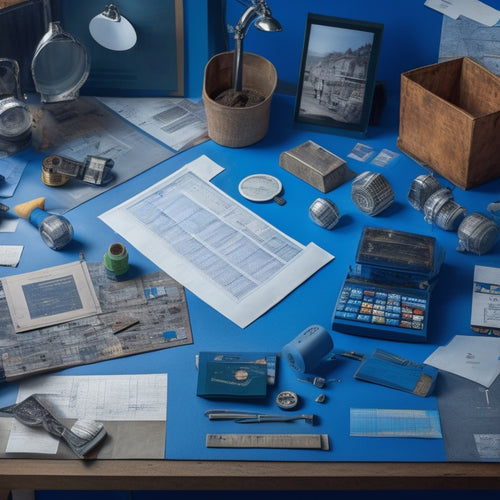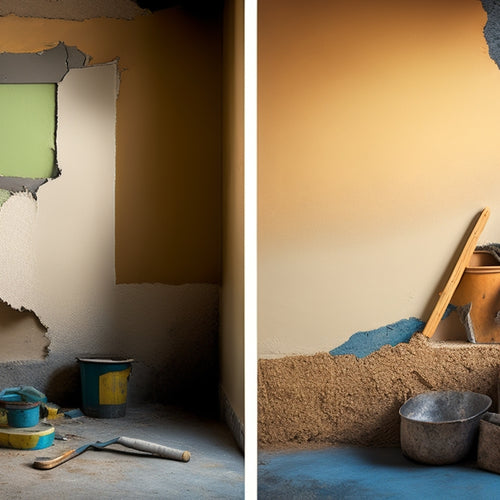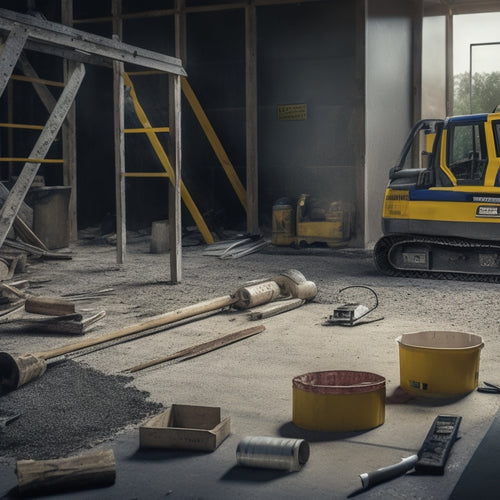
What's the Cost of Renovation Tools for Block Walls
Share
You'll need to budget between $500 and $5,000 or more for the various tools required to renovate a block wall, depending on the scope and complexity of your project. Demolition tools like hydraulic breakers, jackhammers, and wrecking bars can cost between $500 and $2,000+. Cleaning and preparation tools, including HEPA-filter vacuum cleaners, dustless sanding systems, and microfiber dusting cloths, will add to the cost. Cutting and shaping tools, mortar and grout application tools, finishing and smoothing tools, and safety equipment will also be necessary, and their costs will vary. As you prepare for your project, it's crucial to take into account all these factors to get an accurate estimate of the total cost.
Key Takeaways
• The cost of renovation tools for block walls ranges from $500 to $2,000+, depending on the wall size and complexity of the project.
• Demolition tools, such as hydraulic breakers, jackhammers, and wrecking bars, cost between $50 to $2,000+, depending on the tool type and project size.
• Cleaning and preparation tools, including HEPA-filter vacuum cleaners and dustless sanding systems, cost between $10 to $100+, depending on the tool type and quality.
• Block cutting and shaping tools, such as masonry saws and diamond blade grinders, cost between $20 to $200+, depending on the tool type and quality.
• Safety equipment and protection, including hard hats, safety glasses, and respirators, cost between $20 to $100+, depending on the quality and brand.
Demolition Tool Cost Estimates
Estimating demolition tool costs accurately involves identifying the specific tools required to dismantle a block wall, which can range from $500 to $2,000 or more, depending on the wall's size and complexity.
You'll need to take into account the type of demolition tool required for the job, such as hydraulic breakers, jackhammers, or wrecking bars.
Top brands like Bosch, DeWalt, and Makita offer a range of demolition tools that cater to different needs and budgets.
Hydraulic breakers, for instance, are ideal for large-scale demolition projects and can cost upwards of $1,000.
Jackhammers, on the other hand, are more suitable for smaller projects and can cost between $200 to $500.
Wrecking bars, which are manual tools, are the most affordable option, priced around $50 to $100.
When selecting a demolition tool, take into account factors like power source, weight, and vibration control to guarantee you get the right tool for the job.
Cleaning and Preparation Tools
When you're preparing block walls for renovation, you'll need to remove dust and debris from the surface.
You'll have to decide on an efficient dust removal method, such as using a vacuum or a wet mop, to guarantee a smooth renovation process.
Next, you'll need to choose the right surface scraping tools to remove old adhesives, paint, or other substances that may be stuck to the wall.
Dust Removal Methods
You'll need to employ effective dust removal methods to guarantee a clean and stable surface for your block wall renovation, and this involves using the right cleaning and preparation tools.
Dust control is essential to prevent airborne particles from settling on your freshly cleaned surface, compromising the bonding process. For best results, invest in tools that facilitate efficient air filtration.
Some essential dust removal tools for your block wall renovation include:
-
A HEPA-filter vacuum cleaner to capture 99.97% of particles as small as 0.3 microns
-
A dustless sanding system that utilizes a vacuum hose to collect debris
-
A microfiber dusting cloth to wipe down surfaces without leaving streaks or residue
-
A dust-containment tent to prevent particles from spreading to adjacent areas
-
A respirator mask to protect yourself from inhaling harmful dust particles
Surface Scraping Tools
Surface Scraping Tools
With a clean and dust-free surface, you can now move on to scraping off old adhesives, mortar, and other substances that may be interfering with your block wall renovation. This vital step in surface preparation guarantees a strong bond between the old wall and new materials.
| Tool Type | Cost Range | Maintenance Requirements |
|---|---|---|
| Putty knives | $5 - $20 | Regularly clean and store in a dry place |
| Scraping chisels | $10 - $50 | Sharpen or replace blades regularly |
| Adhesive removers | $20 - $100 | Follow manufacturer's instructions for use and storage |
| Wire brushes | $15 - $30 | Clean and store in a dry place, replace worn-out bristles |
| Floor scrapers | $50 - $200 | Regularly clean and lubricate moving parts |
When choosing surface scraping tools, consider the type of substance you need to remove and the size of your block wall. Regular tool maintenance is essential to guarantee their effectiveness and extend their lifespan. By investing in the right tools and following proper maintenance procedures, you can achieve a smooth and even surface, ready for the next stage of your renovation project.
Block Cutting and Shaping Tools
When you're renovating a block wall, you'll need to cut and shape blocks to fit your design.
You'll have to decide on a block cutting method that suits your needs, considering factors like precision and efficiency.
You'll also need to master precise shaping techniques to achieve a professional-looking finish.
Block Cutting Methods
Several block cutting methods are available, including sawing, splitting, and drilling, each requiring specific tools to efficiently cut and shape blocks for your wall renovation project. As you choose the best method for your project, evaluate the type of block, its size, and the desired finish.
Here are some block cutting techniques and materials you'll need to evaluate:
Sawing: Using a masonry saw or a circular saw with a diamond blade to cut blocks quickly and accurately.
Splitting: Employing a block splitter or a hammer and chisel to split blocks along their natural lines.
Drilling: Utilizing a hammer drill or a rotary hammer to drill holes for pipes or electrical outlets.
Wet cutting: Using a saw or a grinder with a diamond blade and water to reduce dust and heat buildup.
Dry cutting: Cutting blocks without water, often used for smaller projects or when water isn't available.
Precise Shaping Techniques
To achieve precise shapes and fits for your block wall renovation, you'll need to employ specialized cutting and shaping tools that build upon the cutting methods discussed earlier. These tools will allow you to refine your blocks' edges, curves, and surfaces, ultimately enhancing the overall block wall aesthetics.
For instance, you can use a masonry saw or a diamond blade grinder to make precise angular cuts or smooth out rough edges. Additionally, a carbide-tipped router or a profiling tool can help you create intricate designs, patterns, or textures on the block surface.
When working with complex masonry shaping techniques, it's crucial to have the right tools for the job. A block chisel set, for example, can be used to remove small amounts of material and create detailed shapes.
A diamond core drill, on the other hand, is perfect for making precise holes for pipes, wires, or other installations. By investing in these specialized tools, you'll be able to achieve professional-looking results and take your block wall renovation to the next level.
Mortar and Grout Application Tools
You'll need a set of specialized tools to efficiently apply mortar and grout to your block wall renovation project. Mortar mixing and grout application require precise techniques to guarantee a strong and durable bond between the blocks. To achieve this, you'll need the right tools for the job.
Here are the essential tools you'll need for mortar and grout application:
-
Mortar mixer: A heavy-duty mixer that can handle large batches of mortar, saving you time and effort.
-
Grout float: A flat, rectangular tool used to spread and level grout between the blocks.
-
Grout sponge: A specialized sponge used to remove excess grout from the surface of the blocks.
-
Trowel: A handheld tool used to scoop and apply mortar to the blocks.
-
Pointing trowel: A small, angled trowel used to fill gaps and joints between the blocks.
With these tools, you'll be able to efficiently mix, apply, and finish mortar and grout to achieve a professional-looking result.
Finishing and Smoothing Tools
After applying mortar and grout, it's time to focus on achieving a smooth, even finish by using specialized tools that help refine the surface of your block wall.
To guarantee a professional-looking result, you'll need to invest in finishing and smoothing tools. These tools will help you achieve the desired texture and appearance for your block wall.
For instance, a trowel is essential for applying and smoothing out finishing materials like stucco or plaster. You'll also need a putty knife or joint knife for scraping and smoothing out excess material.
Additionally, a float or darby will help you achieve a smooth, even finish by removing any imperfections or air pockets.
When it comes to advanced smoothing techniques, a power trowel or a polishing machine can be used to achieve a high-gloss finish.
Safety Equipment and Protection
As you work on your block wall renovation, wearing the right safety equipment and protective gear is essential to preventing injuries and guaranteeing a successful project. You must adhere to strict safety guidelines to minimize risks and avoid accidents.
To guarantee your safety, don't forget to wear:
-
Hard hats to protect your head from falling debris and objects
-
Safety glasses or goggles to shield your eyes from dust and flying particles
-
Dust masks or respirators to prevent inhalation of hazardous materials
-
Steel-toed boots or shoes with good traction to prevent slips and falls
-
Gloves with grip and padding to protect your hands from cuts and abrasions
Specialized Tool Rentals and Costs
Renting specialized tools can greatly impact your block wall renovation budget, with costs ranging from a few hundred to several thousand dollars depending on the scope of your project.
When you're planning your renovation, it's important to take into account the tool rental options that will help you stay within budget. You'll need to assess the specific tools required for your project and compare rental costs from different providers.
For instance, if you need a hydraulic block splitter, you can expect to pay between $200 to $500 per day, depending on the rental duration and location. On the other hand, a block saw might cost you around $100 to $300 per day.
It's vital to research and compare prices to make sure you're getting the best deal. Some rental companies may offer package deals or discounts for long-term rentals, so be sure to ask about these options.
Frequently Asked Questions
Can I Use a Single Tool for Both Demolition and Cleaning Tasks?
You can opt for multi-purpose tools that offer versatility, combining demolition and cleaning capabilities in one device, allowing you to tackle both tasks efficiently and saving you time, effort, and storage space.
Are Block Wall Renovation Tools Available for Rent or Only for Purchase?
As you immerse yourself in block wall renovation, you'll find that tools are available for rent, offering flexibility, or for purchase, providing long-term value. Compare rental options to purchasing costs to determine the best fit for your project's scope and budget.
How Often Should I Replace or Sharpen My Block Cutting Blades?
You should replace or sharpen your block cutting blades every 50-100 cuts, depending on blade quality and your cutting techniques, as part of regular blade maintenance to guarantee peak performance and extend tool lifespan.
What Is the Average Lifespan of a Mortar Mixer Drill Bit?
You'll be surprised to know that 70% of drill bit failures occur due to improper maintenance. On average, a high-quality mortar mixer drill bit lasts around 500-700 mixing cycles, depending on the type, such as carbide-tipped or diamond-coated, and proper maintenance.
Do I Need Specialized Tools for Curved or Angled Block Walls?
When building curved or angled block walls, you'll need specialized curved block tools, like radius molds and adjustable corner blocks, to achieve precise angles and smooth curves, requiring advanced angled wall techniques and expertise.
Conclusion
You've made it to the final tally - the cost of renovation tools for block walls.
Let's face it, it's not a small investment. But, think of it as a necessary 'wall-vestment' in your project's success.
From demolition to finishing, the total cost can range from $500 to $2,000, depending on the scope and tools needed.
Remember, proper preparation and execution are key to a solid, long-lasting block wall.
Related Posts
-

5 Best Home Renovation Project Timeline Checklists
You're looking for a clear understanding of the timeline for your home renovation project. A good place to start is w...
-

Top 3 Tools to Buy for Stucco Renovation
You'll need the right tools to guarantee a successful stucco renovation, and it all starts with three essential items...
-

Home Renovation Safety Checklist for Homeowners
As a homeowner initiating a renovation project, you know that safety should be your top priority. Start by establishi...


